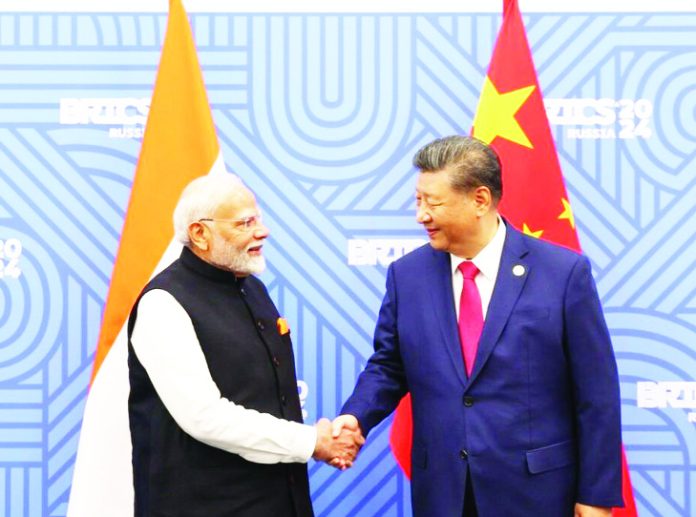Gaurav Gupta
In a defining moment for global diplomacy, Prime Minister Narendra Modi and Chinese President Xi Jinping held crucial talks during the 16th BRICS Summit in Kazan. This long-anticipated meeting marks a turning point in Indo-China relations, which have been strained since the 2020 border tensions. The summit, which brings together key emerging economies, provided the perfect platform for the two leaders to address their nations’ differences and chart a course for peace and cooperation.
This meeting represents more than just a thaw in relations between India and China. It signals a strategic shift that could reshape the global geopolitical landscape. Prime Minister Modi’s firm and visionary leadership was evident as he welcomed the recent agreement for complete disengagement along the disputed border. This breakthrough, achieved through diplomacy, is a significant victory for India, reaffirming its commitment to national sovereignty while keeping the door open for peace and stability.
For India, this is a moment of immense pride. By balancing its national interests with a pragmatic approach to regional harmony, the country has proven that it is a global power capable of resolving disputes through dialogue rather than conflict. As a nationalist, I view this diplomatic success as a testament to India’s strength on the global stage, where it has demonstrated both firmness and flexibility in equal measure.
The conversation between Prime Minister Modi and President Xi highlighted the importance of mature diplomacy. Both leaders agreed that disputes should not be allowed to disturb peace and tranquility, particularly in sensitive border areas. They emphasized the necessity of frequent engagements between the Special Representatives of both countries to ensure the maintenance of peace along the border and to pave the way for a fair and enduring resolution to boundary issues.
This renewed strategic communication between the two nations opens up a range of possibilities for rebuilding Indo-China relations. It sends a clear message that when handled with foresight and a commitment to peaceful resolution, even the most challenging disputes can be resolved. More importantly, this development is not just a bilateral victory-it has wider implications for the world.
Stable relations between India and China have the potential to alter the global power balance, particularly in the eyes of Western countries. For decades, the West has capitalized on the rivalry between the two Asian giants, using it to maintain its own geopolitical dominance in the region. A resolution to the Indo-China border dispute would send shockwaves through Western capitals, as it would undermine the strategic advantage they’ve enjoyed by keeping Asia divided. If India and China were to set aside their differences and work in tandem, it would present a formidable challenge to Western powers, both economically and politically.
As the two most populous nations in the world and economic powerhouses in their own right, India and China hold the key to a multi-polar world. Their cooperation is essential for a stable and prosperous Asia, and by extension, a stable world order. The West, which has long viewed the rise of Asia with caution, would be forced to reconsider its strategies if India and China were to strengthen their partnership. The possibility of these two nations working together on global issues, from trade to climate change, could dramatically shift the balance of power away from the West.
At the heart of this development is a shared understanding between Prime Minister Modi and President Xi that peace and stability are essential not only for their own countries but for the entire region. Their commitment to a long-term strategic partnership, underpinned by enhanced communication and cooperation, offers a pathway to addressing shared challenges while fostering regional prosperity. This partnership has the potential to be a game-changer, not just for Asia, but for the world.
As someone with a deep interest in geopolitics, I believe this diplomatic breakthrough demonstrates India’s strategic acumen under Prime Minister Modi’s leadership. His ability to navigate complex global dynamics while safeguarding India’s national interests is remarkable. By prioritizing peace and cooperation with China, India has shown that it is not only a regional leader but also a key player in shaping the future of global politics.
In conclusion, the meeting between Prime Minister Modi and President Xi at the BRICS Summit is a historic moment that could redefine Indo-China relations. It marks the beginning of a new chapter-one that holds the promise of peace, cooperation, and mutual growth. For the West, this development is a wake-up call, as it signals the rise of a more united Asia, ready to challenge the old world order. As India and China continue to engage in dialogue, the world will be watching closely, aware that the future of global politics may well be decided by the actions of these two nations.
(The author is Secretary Jammu Club, BJP Leader Geopolitical Expert)
Trending Now
E-Paper


